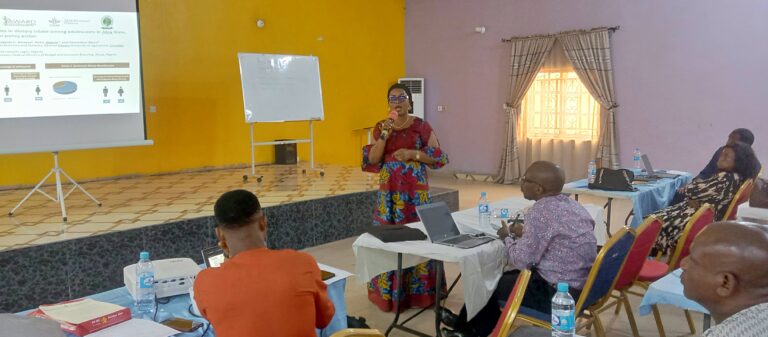By Felicia Imohimi
Dr Patricia Ukegbu, Head of the Department of Human Nutrition and Dietetics at Michael Okpara University of Agriculture, Umudike, has called for the inclusion of adolescent nutrition considerations in the National Policy on Food and Nutrition (NPFN).
Ukegbu, an Associate Professor at the university, stated that such a move would help reduce the long-term burden of stunting and contribute to achieving nutrition security in Nigeria.
She made the recommendation on Tuesday during the first-quarter coordination meeting of the National Committee on Food and Nutrition (NCFN) in Auta-balefi, Nasarawa.
The News Agency of Nigeria (NAN) reports that Ukegbu is a Policy Fellow of the Gender Responsive Agriculture Systems Policy (GRASP), an initiative of African Women in Agricultural Research and Development (AWARD).
She delivered a presentation titled “Integrating Gender-Responsive Adolescent Nutrition Considerations into the NPFN”.
She explained that although the current policy acknowledges gender inequalities, it lacks specific provisions to address disparities related to adolescent nutrition.
She identified these inequalities as relating to food and nutrition security, access to healthcare services, educational resources, social protection, and empowerment.
“The NPFN contains no specific national provisions for younger adolescent females (aged 10–14) and males in general (aged 10–19),” she noted.
“The policy rightly focuses on children under five and women of reproductive age. However, it inadequately engages adolescents in interventions designed to meet their distinct nutritional needs”.
Ukegbu advocated for a review of the 2016 NPFN to incorporate gender-responsive strategies on adolescent nutrition, including the promotion of adolescent participation in policymaking processes.
She also recommended the development of clear objectives, targets, and strategies to improve adolescents’ nutritional knowledge and dietary behaviours.
According to her, these measures are critical to ensuring adequate nutrition for the nation’s adolescent population.
Ukegbu highlighted the opportunities for strengthening gender-responsive adolescent nutrition in Nigeria, including policy, programme, and legal frameworks.
She cited existing programmes such as school feeding, food fortification, dietary diversity, and biofortification.
The nutrition expert outlined key challenges facing adolescent nutrition, including inadequate diets, malnutrition, food insecurity, and the absence of gender-responsive policies and programmes.
She also mentioned the lack of national age- and gender-disaggregated data on adolescents’ nutritional status, food consumption, and nutrition knowledge.
She noted that most existing programmes targeting adolescents are primarily focused on reproductive health.
Also speaking at the event, Prof. Ngozi Nnam, an expert in Community and Public Health and Paediatric Nutrition at the University of Nigeria, Nsukka, advocated for a life-cycle approach to nutrition.
Nnam emphasised the need to prioritise nutrition at every life stage from early childhood through adolescence and into old age.
She said: “Adolescence is a critical developmental phase.
“While most development occurs from conception through the first 1,000 days, the adolescent stage is another key window when substantial physical and cognitive growth takes place.
“If nutrition is properly addressed during adolescence, it can help correct some deficits incurred earlier in life”.
Dr Victor Ajieroh, a nutrition expert and AWARD mentee to Ukegbu, described the advocacy for adolescent nutrition inclusion in the NPFN as timely.
He stressed that such inclusion would allow the country to maximise the benefits of its demographic structure.
Ajieroh maintained that while the nutrition of mothers and children under five must remain a priority, strategic attention should also be paid to adolescents aged 10 to 14.
“The school feeding programme should be expanded to include this age group.
“We must strengthen school-based health, nutrition, and agricultural programmes, especially in secondary schools, to prepare adolescents for their most productive years.
“Once they leave school, they enter the workforce and become part of the nation’s productive population.
“From a reproductive health standpoint, as they transition into early adulthood, many begin to marry and start families.
“If we want future generations of healthy children, we must first ensure that today’s adolescents are well-nourished and healthy.
“We must equip them with the knowledge and habits that promote good nutrition, not only for themselves, but also for their future families, “he added.
NAN reports that participants at the meeting included representatives from the Federal Ministry of Budget and Economic Planning, the Federal Ministry of Agriculture and Food Security, civil society organisations, and development partners. (NAN)
Edited by Tosin Kolade












